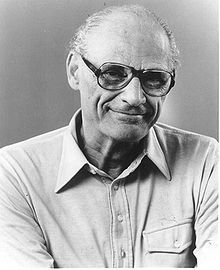The American Clock
Written by Arthur Miller
Directed by Lucas Adams
Reviewed by Keith Waits
Entire contents are copyright © 2012 Keith Waits. All rights reserved.
 |
| Playwright Arthur Miller. |
The American Clock arrived very late in Arthur Miller’s career, premiering in New York in 1980, more than 60 years after his masterwork, Death of a Salesman, helped form the post-World War II American theatre. Unfortunately, it lacks the bold and focused vision of vintage Miller, even while it traffics in worthwhile themes that would seem to be ideal subject matter for this great writer.
Miller draws on Studs Terkel’s book Hard Times in telling the story of the Baums, a wealthy family who suffers greatly during the Great Depression of the 1930s. For anyone familiar with the history, there is little that is truly new, even if some of it is forcefully presented. Individual character moments are powerful, but they alternate with clichéd images of suicide and surrender that have been better realized elsewhere, in the hands of other writers. In short, it is docudrama with not enough drama.
So if this is not Miller at his best, we may forgive some of the stiff playing, for it results, in part, from a cast struggling to push past the limitations of a script that is often too didactic for its own good. The actors get stuck delivering speeches more often than they interact, and only in the second act do they find good stuff to play. Once that happens, the story begins to more fully engage.
Some of the young cast manage to deliver the goods. Chief among them is Brooke Morrison, who, in her multiple roles, brings the surest understanding of character and circumstance to the stage and seems entirely natural in her every moment onstage. Sydney Welch displayed a knack for physical comedy in several diverting instances, while Peyton Froula and Catherine Young both made promising debuts in their first Walden Theatre main-stage production. Allison Spanyer is charming as the Baum matriarch, although she misses the depth and pathos of the script’s most developed character. Carter Caldwell and Ian Jackson, both more seasoned veterans, are confident and authoritative while stranded too often declaiming narrative exposition instead of playing characters. Still, they lead the company in a valiant effort to make emotional sense of the dense, verbose history lesson.
It is worthwhile recognizing that we can count on Walden Theatre to explore theatrical history with such choices, as The American Clock may only rarely find a host stage in Louisville. To be given the opportunity to examine the lesser known works of such important playwrights is illuminating, even if the results only help confirm why they are lesser known.
There is much good effort exhibited in this production. In his director’s notes, director Lucas Adams makes explicit notes on the parallels with the current state of affairs in the U.S. to the Great Depression and stock market crash of 1929 that triggered it. The parallels are less directly made in the artistic choices of costuming the cast in modern dress that only makes allusion to the period, so that when Mr. Caldwell and Mr. Jackson are explaining themselves, the resemblance their sleek look and stylish haircuts give to contemporary financiers is no coincidence. It is a noteworthy attempt to connect the material to the times and lend it some relevance, even if the limitations of Miller’s text hamstring its full effect.
There is much good effort exhibited in this production. In his director’s notes, director Lucas Adams makes explicit notes on the parallels with the current state of affairs in the U.S. to the Great Depression and stock market crash of 1929 that triggered it. The parallels are less directly made in the artistic choices of costuming the cast in modern dress that only makes allusion to the period, so that when Mr. Caldwell and Mr. Jackson are explaining themselves, the resemblance their sleek look and stylish haircuts give to contemporary financiers is no coincidence. It is a noteworthy attempt to connect the material to the times and lend it some relevance, even if the limitations of Miller’s text hamstring its full effect.
The American Clock
February 23-25 & March 1-3 @ 7:30
February 25 & March 3 @ 2:00pm
February 25 & March 3 @ 2:00pm
Walden Theatre
1123 Payne Street
Louisville, KY
(502) 589-0084




